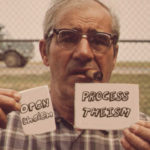We run our website the way we wished the whole internet worked: we provide high quality original content with no ads. We are funded solely by your direct support. Please consider supporting this project.
What is the significance of Jeremiah 36:1-6
The Lord has Jeremiah write his prophecy on a scroll, telling him, “Perhaps when the people of Judah hear about every disaster I plan to inflict on them, they will each turn from their wicked ways; then I will forgive their wickedness and their sin” (Jer. 36:3). Jeremiah then tells his scribe to take the scroll and read it to the people, telling him, “Perhaps they will bring their petition before the LORD, and will all turn from their wicked ways..” (vs. 7). It turns out the people didn’t listen to the prophecy (vs. 24-25). “Therefore,” the passage says, the Lord judged them (vs. 30-31).
If the future is eternally settled and God knows it as such, how can God in good faith tell Jeremiah that something might happen that he knows will not happen? Doesn’t the fact that God motivated Jeremiah by telling him the people might repent mean that it was possible they would repent (and also possible they would not)? And this implies that the future is composed, in part, of possibilities and that God, being omniscient, knows it as such.
Category: Q&A
Tags: Open Theism, Q&A
Topics: Open Theism
Verse: Jeremiah 36
Related Reading

Process Theology & Open Theism: What’s the Difference?
Question: When ReKnew talks about Open Theism is it a mistake for people to equate it with Process theology, and if so what are the defining differences? I guess I am starting to lean toward Dr. Boyd’s thoughts for all things theologically egg-heady, so I thought I would ask the question. Your ministry has been freeing…

How do you respond to Acts 17:26?
“From one ancestor he made all nations to inhabit the whole earth, and he allotted the times of their existence and the boundaries of the places where they would live.” (cf. Dan. 2:21) In this passage Paul is preaching to Epicurean and Stoic philosophers (17:18). His goal is to show them that, in contrast to…

How do you respond to Proverbs 16:4?
“The Lord has made everything for its purpose, even the wicked for the day of trouble.” Calvinists often cite this verse to support the conclusion that some people are created wicked for the expressed purpose of being sent to hell. Since Scripture teaches that God is love (1 John 4:8, 16), that God loves all…

What Does Greg Think About _________________?
Since the launch of the new website yesterday, I’ve been browsing around the various topics to see what I can find. You can click here to join me. This is awesome. If you want to know what Greg has to say about the nature of the future and God’s knowledge of it, you can find…

What happens to babies who die?
The Bible does not directly address the issue of what happens to babies who die before being able to make a decision for or against Christ. People have thus had to arrive at conclusions about this matter on the basis of other beliefs they hold to be true. The majority of evangelicals today assume that…

Does God Intervene?
Given the vast influence of angelic and human free will, what influence does God have in determining what comes to pass? While God has an important role to play in anticipating and creatively responding to decisions agents make, is God only a responder? Does he have anything to do with what’s going on in creation?…
